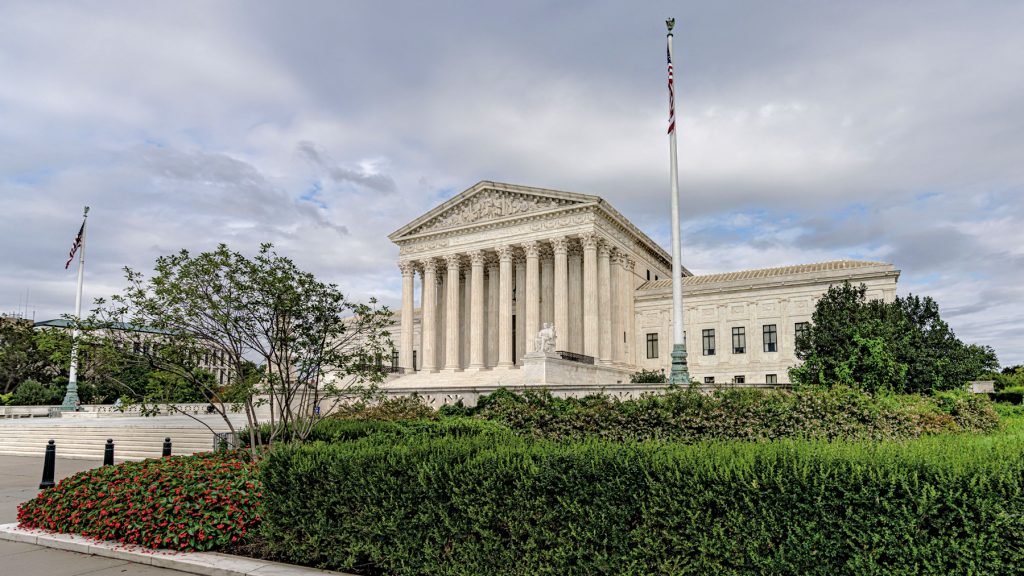By Stacy M. Brown
NNPA Senior National
Correspondent
In a surprising decision on Thursday, the Supreme Court struck down Republican-drawn congressional districts in Alabama, ruling that they discriminated against Black voters.
The 5-4 vote means state officials must redraw the heavily Republican-favored map of Alabama’s seven congressional districts.
Chief Justice John Roberts and Justice Brett Kavanaugh, both conservatives, joined the court’s three liberals in the majority.
The ruling by the court, which currently holds a 6-3 conservative majority, marks a departure from the state’s attempt to make it more challenging to address concerns raised by civil rights advocates regarding the dilution of Black voters’ power in states like Alabama, where voters are divided into districts where white voters dominate.
The cases brought before the court were consolidated and originated from the litigation over the new congressional district map, which the Republican-controlled Alabama Legislature drafted after the 2020 census.

The challengers, including individual voters and the Alabama State Conference of the NAACP, argued that the map violated Section 2 of the 1965 Voting Rights Act by discriminating against Black voters.
Under the new map, only one out of seven districts would likely enable Black voters to elect a candidate of their choice.
The NAACP contended that Alabama, with a population of over a quarter of its population made up of Black residents, should have at least two such districts. The organization presented evidence supporting the feasibility of drawing an additional majority-Black district.
In January 2022, a lower court agreed with the challengers, ruling that the plaintiffs had demonstrated, in line with Supreme Court precedent, that Alabama’s Black population was both sizable and compact enough to warrant a second majority-Black district.
The court ordered the redrawing of the map. However, Alabama’s Republican Attorney General, Steve Marshall, turned to the Supreme Court, which placed the litigation on hold and agreed to hear the case.
During the November election, the Supreme Court was split 5-4 in allowing the use of the new map. Chief Justice John Roberts, a conservative, dissented and joined the court’s three liberals.
In the election, Republicans secured six out of the seven seats, while Democrats won the majority-Black district.
If a new map had been implemented, Democrats might have gained an additional seat.
The Supreme Court’s decisions in cases like the Alabama one have been seen as potentially contributing to Republicans’ slim majority in the House of Representatives.
Alabama argued that the lower court excessively emphasized race when reaching its conclusions.
Attorney General Steve Marshall asserted in court documents that the challengers’ ability to demonstrate the possibility of drawing a second majority-Black district did not constitute sufficient evidence of discriminatory actions by the state. Marshall cited other “race-neutral” factors in map drawings, such as regional culture, identity, and the requirement for districts to have similar population sizes.
Over the past decade, the Supreme Court has weakened the Voting Rights Act in two separate cases.
In 2013, the court significantly limited a crucial provision of the law that allowed for federal oversight of election law changes in specific states.
In a 2021 ruling related to Arizona, the court made bringing cases under Section 2 of the Voting Rights Act more challenging.
This case is one of three that the court is currently hearing where conservative attorneys promote what they view as politically correct, race-neutral arguments to address racial discrimination.
In other cases, the court may end affirmative action in college admissions and strike down parts of a law that provides preferences to Native Americans seeking to adopt Native American children.
The court is also deliberating another significant election-related dispute in the current term.
The ruling, expected before the end of June, will address a Republican initiative to limit state courts’ authority to enforce state constitutional provisions in federal elections.
Should the court uphold the initiative, it could facilitate Republican-led legislatures’ efforts to restrict voting rights.




